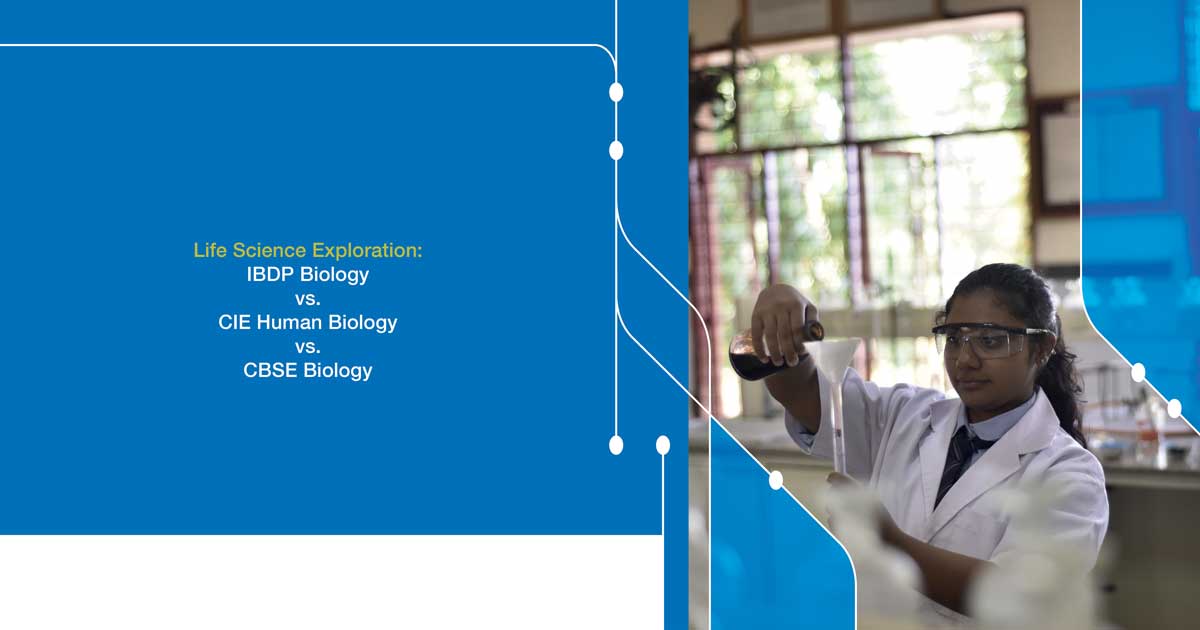

The Biology course in IBDP is designed to introduce learners to the core concepts and understand their relevance and application in an interdisciplinary scenario. In CIE’s Human Biology course, a learner will study all the key concepts of Human anatomy and issues related to it such as diseases, nutrition, and energy, among other things. The CBSE Biology programme teaches the basic principles of biology and its relevance to individuals and society. The course is relevant for any aspirant who plans to pursue a career in medical science or environmental science. Let us examine the biology courses offered by the three boards, that is, IBDP Biology, CIE Human Biology, and CBSE Biology.
IBDP Biology is offered at Standard Level (SL) and Higher Level (HL) and the students can choose which curriculum they prefer. In both courses, the learner will be assessed internally and externally. The syllabus for the programme is as follows:
| Standard Level | Higher Level |
|
Core Modules - Cell biology, Molecular biology, Genetics, Ecology, Evolution and biodiversity, Human physiology |
|
| Optional (choose any 1) - Neurobiology and behaviour, Biotechnology and bioinformatics, Ecology and conservation, Human physiology | Additional modules - Nucleic acids, Metabolism, cell respiration and photosynthesis, Plant Biology, Genetics and Evolution, Animal physiology Optional (choose and 1) - Neurobiology and behaviour, Biotechnology and bioinformatics, Ecology and conservation, Human physiology |
The assessments include 3 external exams, one 2000-word essay, and a group project. Since HL has a wider syllabus, its assessments will cover broader topics and be more extensive. IBDP curriculum focuses on interdisciplinary understanding of the subject, so learners will be writing an extended essay which focuses on the application of theories and understanding in solving or explaining real problems too.
The Human Biology course offered by CIE programme covers the following topics:
The assessment for the course will be done through three written exams and one practical assessment.
CBSE’s Biology course covers the following subjects:
The CBSE curriculum includes classroom lectures, lab experiments and practical work. The assessment will be conducted through a written exam, practical work through lab experiments and creating and maintaining a detailed project record. There will be a viva voce where the students will be questioned on their project work and practical work.
With Biology or Human biology courses, a learner can pursue graduate programmes in many fields. They qualify for graduate courses in Pure science such as Biology, Microbiology, Forensic Science, or Genetics to name a few fields. They will work in medical science fields in hospitals, pharma companies, medical research companies, Oil and gas companies, fisheries industry etc. to name a few. Some of the roles in which a professional with a background in Biology will work include:
Biology is a prerequisite for many courses such as MBBS, B. Pharma, and B. Tech Biotechnology to name a few. In the 12th grade, the course offered by all three boards sets a strong foundation through deep study of the basic concepts. Learners can apply their understanding of these topics in various other related fields such as food science, environmental science, and related fields. If you are unsure about the Engineering course that you want to pursue after the 12th, then it is safe to take Biology to keep your options open.
Recent Blogs
Site Designed and Maintained By : Office of Communications, JAIN Group All rights reserved.